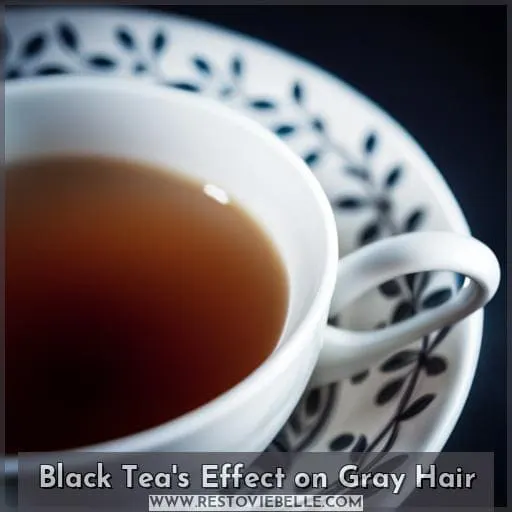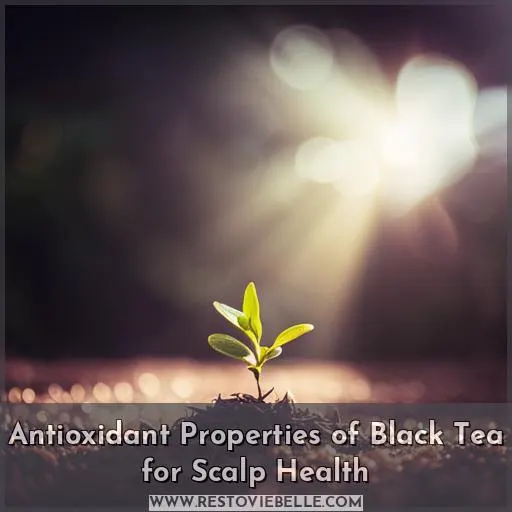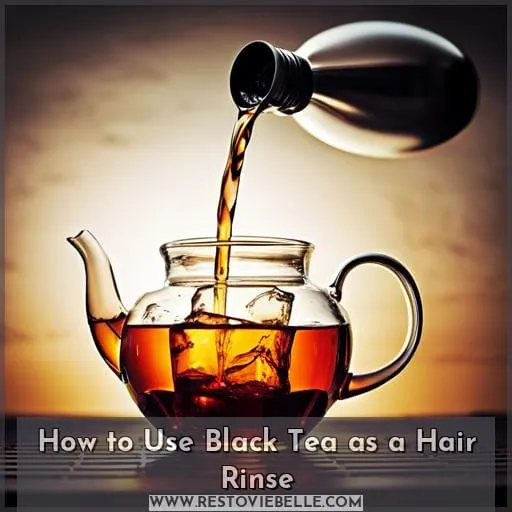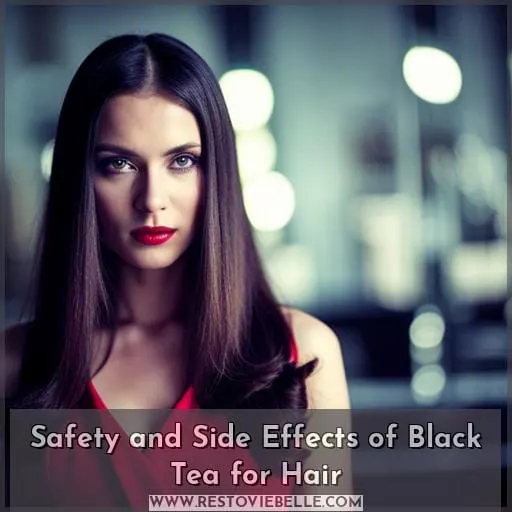This site is supported by our readers. We may earn a commission, at no cost to you, if you purchase through links.
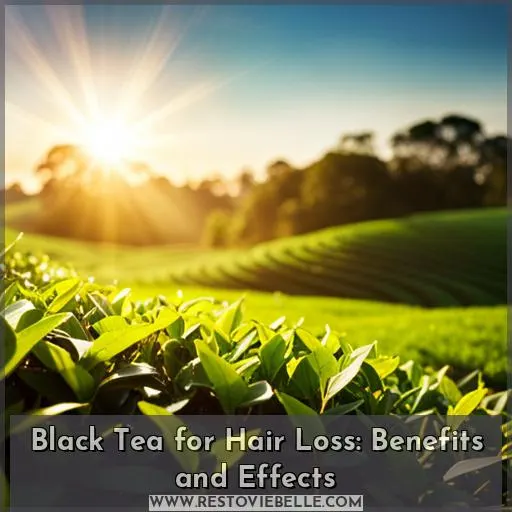 Powerful polyphenols from black tea have the potential to be a powerful potion for your hair.
Powerful polyphenols from black tea have the potential to be a powerful potion for your hair.
Enhancing color. The polyphenols can bring out hair’s natural pigments and create a richer, shinier color.
Promoting growth. Compounds in black tea may help stimulate hair follicles and encourage new growth.
Increasing shine. Caffeine is thought to promote blood circulation to the scalp and strengthen strands.
People have used black tea as a beauty remedy for centuries, but does science support these claims? Research shows promise for black tea and hair health, but more studies are still needed.
Some evidence suggests black tea extracts could help reduce hair loss by inhibiting DHT, a hormone that causes follicles to shrink.
You can make an effective rinse using this fragrant beverage to possibly boost hair’s luster and thickness. Steep 2-3 bags of black tea in 2 cups of hot water for 30 minutes. Allow to cool, then pour it on clean, washed hair and massage into scalp.
Be sure to use freshly brewed tea and repeat 1-2 times per week for best results. While more research is needed, black tea contains compounds that may enhance hair’s natural beauty. This aromatic ingredient can be an easy and fragrant addition to your hair care regimen.
Table Of Contents
Potential Benefits of Black Tea for Hair Health
Let’s cut to the chase and discuss the potential benefits of black tea for hair health.
Enhancing hair color
Supporting hair growth
Promoting shiny hair
With the right approach, black tea could offer some advantages for hair health, but more research is still needed to confirm the benefits.
There are a few key ways black tea may help hair:
The antioxidants in black tea may enhance hair color and shine by neutralizing free radicals from UV exposure and other damage. The small amount of caffeine in black tea may also support hair follicle health.
Some early research shows black tea extracts applied to the scalp may boost hair growth, but more studies are needed. The caffeine and antioxidants may support growth by improving blood circulation and reducing inflammation.
Overall, black tea contains compounds that, in theory, could strengthen hair from root to tip. But current research is limited, so more studies are necessary to confirm whether black tea delivers meaningful improvements for hair health and appearance.
Enhancing Hair Color
Your strands can temporarily gain richer color from black tea’s tannins, though the enhancement’s short-lived and ineffective for light hair.
The theaflavins and thearubigins in black tea provide its dark hue and may temporarily enhance color in brunette or black hair. However, the tannins can’t penetrate lighter shades, so blonde or gray hair won’t darken with a black tea rinse.
This color boost is temporary, as the tea pigments wash away with shampooing.
Focus application on the scalp to target hair growth instead of relying on black tea solely for coloring.
Consult a stylist for lasting hue changes, keeping in mind that black tea offers only a superficial, fleeting dye job for dark strands.
Supporting Hair Growth
Now let’s explore how black tea can potentially support hair growth. Black tea contains antioxidants that may promote hair growth by inhibiting DHT, though more research is needed.
The caffeine in black tea could also increase keratin production. While using a black tea rinse is an easy option to try, it’s crucial to remember it’s not a proven cure.
Persistent hair loss should involve consulting a dermatologist for guidance.
Promoting Shiny Hair
Shiny hair results from your well-hydrated and undamaged hair. But black tea rinses could theoretically boost shine by enhancing hair color, though no scientific evidence supports this claim.
Limited studies support black tea’s role in hair shine. Black tea’s caffeine can potentially dry hair when overused, so conditioner after rinsing is key.
Hydrating damaged hair follicles boosts shine. Black tea may help, but more research on actual shine effects is needed.
Black Tea’s Effect on Gray Hair
Six studies show black tea doesn’t reverse graying as it doesn’t affect melanin levels, but its antioxidants may slow the graying process so reap benefits by using it routinely:
Graying occurs when melanin production decreases with age. Drinking black tea can’t reverse this.
However, black tea’s antioxidants may help slow down the graying process by protecting hair follicles and reducing oxidative stress.
- Using black tea rinses routinely could help delay the onset of gray hairs.
While black tea doesn’t reverse gray hair, incorporating it into your hair care regimen may provide antioxidant support to postpone graying. Consult a trichologist to understand graying causes and explore options to gracefully embrace your new salt and pepper locks.
Antioxidant Properties of Black Tea for Scalp Health
Apply a black tea rinse to possibly reduce scalp irritation since its antioxidants may protect your skin cells from damage that can inhibit healthy hair growth.
Black tea is known for its antioxidant properties, which can help combat oxidative stress on the scalp. Oxidative stress occurs when there’s an imbalance between free radicals and antioxidants in the body, leading to cell damage.
By applying a black tea rinse, you may be able to provide your scalp with additional protection against this oxidative stress.
The antioxidants present in black tea can also benefit hair strands directly by preventing damage caused by environmental factors such as pollution and UV radiation. This helps maintain the overall health of your hair strands and promotes good scalp health.
To create a black tea rinse, steep some black tea bags in boiling water until it cools down completely. Then spray or pour this mixture onto your clean scalp and hair after shampooing but before conditioning.
Incorporating regular use of a black tea hair rinse into your routine could potentially improve both the health of your scalp and hair strands due to black tea’s antioxidant properties. It is an easy and affordable option to explore for those who are looking to combat scalp irritation and promote scalp health effectively.
Caution should be exercised as caffeine in black tea may dry out hair, so it’s best applied to the scalp using a spray bottle. Consult with a dermatologist if you suffer from persistent irritations or hair issues as they can provide expert guidance.
In summary, black tea rinses can provide multiple benefits for your scalp health by reducing irritation and protecting skin cells from damage caused by oxidative stress.
How to Use Black Tea as a Hair Rinse
You can make an easy black tea rinse to use on your hair by steeping a few black tea bags in hot water, letting the mixture cool, and then pouring it over your shampooed hair in the shower.
- Boil water and remove from heat.
- Add 2-3 black tea bags and let steep 5-10 minutes.
- Allow tea to cool completely so it’s not hot.
- After shampooing hair, pour tea rinse through hair, working it into scalp.
While evidence for efficacy is limited, a black tea rinse provides an affordable, harmless option to potentially support hair health and color, especially for those with dark locks. Using a conditioner after rinsing can prevent dryness from the tea. Consult a dermatologist for any persistent hair issues like thinning or male pattern baldness.
Safety and Side Effects of Black Tea for Hair
But when using black tea on your hair, you’ll want to keep some safety precautions and potential side effects in mind.
While black tea may temporarily enhance hair color for those with dark locks, overuse of caffeine could potentially cause dryness or irritation. It’s wise to do a skin patch test before applying black tea rinses, especially if you have sensitive skin.
And remember that results from animal models don’t always correlate to effects in humans. While black tea is reasonably safe to experiment with, claims of it promoting shiny hair or blocking DHT lack solid clinical evidence.
It’s best to consult your dermatologist if experiencing significant hair loss rather than relying solely on black tea or oral finasteride. Persistent issues often require professional guidance to determine underlying causes and scientifically-proven treatments.
Conclusion
It’s estimated that up to 80% of men and women will experience some degree of hair loss in their lifetime.
Black tea may offer a natural solution for those looking to reduce hair loss and boost hair health. Its polyphenols, antioxidants, and caffeine can help bring out hair’s natural pigments, stimulate hair growth, and promote a healthy shine.
While more research is still needed, black tea could be a powerful potion to help you maintain your luscious locks.

